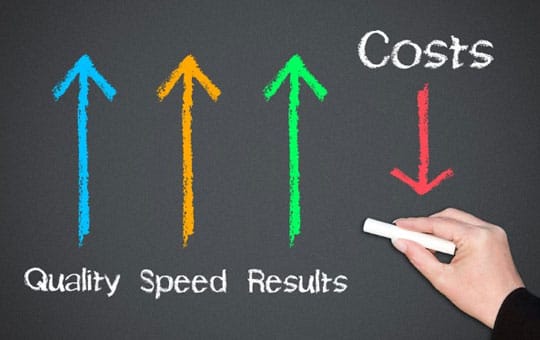Time and again, businesses have asked how technology optimizes the budget and increases the revenue? Considering the rise of expenses and pandemic-induced work-from-home culture, the answer to the problem is Desktop as a Service (DaaS).
There’s no doubt in the fact that technology adoption has soared to improve the cost of management. We have received five years’ worth of business and customer digital transformation in as little as eight weeks.
Therefore, it is safe to say that businesses value technologies that enable remote working, seamless productivity, and optimized costs. Desktop as a Service (DaaS) is one such technology allowing companies to eliminate overheads and improve cost-effectiveness.
How Cost-Efficient Are Cloud Desktops (DaaS) in 2021?

Desktop as a Service is a Virtual Desktop Infrastructure (VDI) that hosts your business desktops on the cloud. These desktops reside on a cloud server, drawing power from the resources of the provider. The access is offered over a network to a range of employees.
This type of infrastructure can save you money because you are not managing the entire server in-house. You are just renting a space and using hosted desktops on it.
Let’s evaluate how cost-efficient cloud desktops are.
Recommended for you: The Future for Cloud VDI and Desktop as a Service (DaaS) is here now!
1. No Initial Setup

The DaaS infrastructure on the cloud server is managed and upgraded by your DaaS provider. When you find the right provider and collaborate with them, they become responsible for migrating your desktops, apps, and data to the cloud server. The provider achieves the entire initial setup, and once your desktops are ready, you get remote access.
Ideally, we spend a lot on purchasing, setting up, maintaining, upgrading, and replacing office desktop units. On the cloud, there are no such costs. The best desktops or devices to use for cloud desktops are the devices you already have. This includes your office desktops, employees’ personal devices, smartphones, etc. DaaS offers high performance without drawing resources from the configuration of the end devices. This saves money—hundreds of dollars every year.
2. Optimum Business Security

Did you know that the pandemic has increased cybercrimes by more than 300%?
One of the biggest expenses for businesses is their security architecture. We need to take care of business security to safeguard employee data, sensitive customer-related files, personally identifiable information, accounting data, and other important office files.
DaaS is built with ingrained security. For this, let’s understand how DaaS works:
When you host your desktops on the cloud, the DaaS provider sets up a connection via a secure network to offer virtual desktop images. These virtual images are created using the virtualization technique, wherein we can ideally create multiple virtual images of the same desktop. These desktops, when opened on end devices, don’t store data or apps.
Now, if the end device crashes, falls in the water and stops working, or suffers a cyberattack, your cloud desktops are still safe.
DaaS providers also use other security controls like Intrusion Detection and Prevention, TLS 1.3 and 256-bit encryption, and multi-factor authentication.

3. Pay as You Go Model

Daas works on the pay-as-you-go model. You don’t need to buy hardware at your expense when you are scaling or upgrading your computers. You only need to inform your service provider to improve your resources and scale your storage to perform better. The charge of this increases as per your desktop costing, not as per the used hardware and software. So, ultimately your cost of scaling is minimized.
Another necessary extension of pay as you go model is the ability to descale. As quickly as you can scale up, you can descale as well. This means that you can call your provider and reduce your storage or resources. Your pricing will decrease accordingly. Since you are not stuck with the maintenance and upkeep of additional hardware, your overall costing reduced.
4. Better Productivity

When some or all of your employees live in separate towns or travel frequently, communication is hampered. However, DaaS offers virtual desktops to your employees, using which they can coordinate online on one file or report. The changes made are immediately reflected in every virtual instance. Essentially, every employee is virtually using the same file through the cloud, so collaboration is easy.
This eliminates disruptions and bottlenecks that office desktops place on your communication. As a result, business productivity improves. With better productivity, we earn more and waste less—cost efficiency is here too!
5. Zero Maintenance Needs

Your IT team needs to plan upgrades, hardware changes, software upgrades, security patches, and manage the IT infrastructure in the office. This team also needs to ensure regular backups for business continuity.
Once you start using DaaS, you are handing over the entire management to your DaaS provider. This means that your IT team is not responsible for all this. Your provider manages upgrades, hardware modifications, security patches, etc., strategically.

6. Easier Remote Working

During the pandemic, businesses have used a series of remote working architectures, like VPN setup using individual laptops, VDI, and DaaS. The most cost-efficient of these all is DaaS because it allows BYOD policy.
When you don’t have the budget to provide devices to your employees, simply allow BYOD and reduce hardware costs further. Due to the high security of DaaS, you don’t need to set up a policy or prepare the end devices. You only need to ask your employees to start accessing cloud desktops from any device.
You may like: 8 Excellent Amazon Web Services (AWS) You Should Consider to Use in Your Next Web Application Project.
7. Regular Backups

With your data stored on-premise, involves investing in a dedicated IT team to manage your data round-the-clock. And in case of data loss, it is your IT team’s responsibility to restore the backups in order to continue business operations.
On the other hand, with Desktop as a Service, handling your data becomes your service provider’s responsibility. Most third-party providers take monthly/daily data backups to avoid loss of information at any given time and ensure maximum availability, thereby saving the budget spent on the IT team.
8. Prevent Data Loss

Storing your important files and applications on local desktops makes them more prone to natural or human-made disasters such as floods, fire, theft, and hacking, which might lead to the unavailability of your data. To make sure your data is secured, either you must install multiple encryptions or store your data in an in-house server. Both of which will have a direct impact on cost.
With Desktop as a Service, your data is stored on remote locations ensuring uninterrupted, secure access even in case of disasters. DaaS also ensures business continuity so that your data is always available even in case of disasters.
9. Supporting Temporary Employees

In recent times, temporary or contract workers, freelancers, and consultants have become a growing part of the economy. They can easily replace permanent employees going on sabbaticals or help during a busy business season. But the IT team needs to take out the time and money taken to set up local machines every time a temporary worker is hired.
With Desktop as a Service, users with a license can skip the lengthy process to simply log in to the hosted desktops, thereby saving time, money, and resources spent on setting up local machines.
Calculating Return on Investment with DaaS

Now that you’ve made yourself familiar with the cost aspects of Desktop as a Service let’s understand whether undertaking DaaS would be a significant milestone for your business.
Here are some factors that can support in evaluating the ROI of DaaS:
1. Calculate IT Costs

It would be best to calculate the entire cost of the in-house IT team, the security costs in terms of network, physical, or end-point security, and the cost of maintaining and updating the software and operating systems for all employees. Depending on the nature of your business, you would also require an IT team that works round-the-clock, which means double the cost in terms of their salary other expenses.
In such cases, opting for a third-party service provider to take care of all these factors can reduce your expenses significantly.
2. Determine Current Infra Cost

It’s vital to understand how many employees do you have currently, how many desktops, laptops, tablets, or mobile devices are required, whether if the devices used have reached their shelf life or are new, is the in-house server space is enough, or will you have to expand in the near future, and more such questions.
If the capital expenditure spent on all of these factors is more than the much smaller monthly expense that DaaS would cost, it will make sense for your business to switch to Desktop as a Service.
You may also like: Online Privacy Best Practices: How to Protect Your Digital Data?
Conclusion

Many organizations are accepting DaaS as a permanent remote working solution because of the various benefits that it offers. But at the end of the day, the question that matters is, how many dollars is DaaS going to save? DaaS turns out to be a cost-efficient infrastructure and reduces your overheads, improves budget allocation for hardware management, and optimizes your scaling costs.
Therefore, it seems logical to adopt DaaS in place of on-premise VDI or VPN-enabled workplace desktop architecture. You only need to find the best DaaS provider for optimum budget allocation, higher revenue, and reduced costs.





